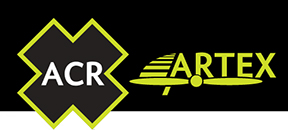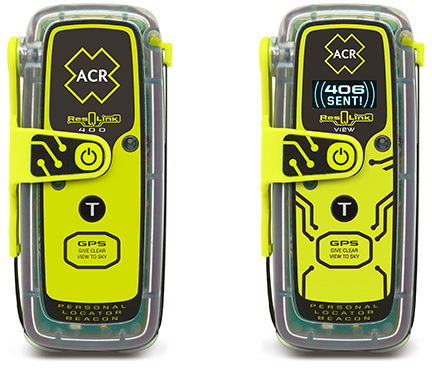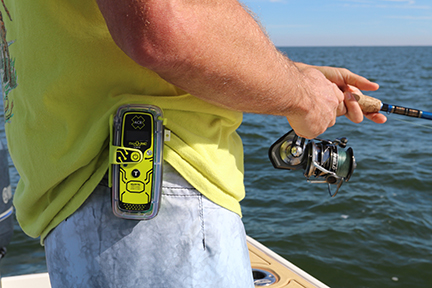
ACR Electronics is launching their next-generation ResQLink™ Personal Locator Beacons (PLB) that now incorporates first-hand feedback from survivors who have activated the beacons in real-life emergencies — the new ResQLink 400 and ResQLink View PLBs introduce user-friendly design innovations and add enhanced functionality to provide a range of adventurers with a trusted and affordable link to rescue in a life-threatening situation.

Bringing the benefits of ACR’s unique digital display capabilities to ResQLink users for the first time, the ResQLink View with Optical Display Technology adds even more reassurance and peace of mind to outdoor enthusiasts. The screen displays all the beacon’s operational activities, including GPS coordinates, operating instructions, usage tips, transmission bursts, as well as battery power.
Compact, lightweight and easy to carry, the new ResQLink beacons feature a protected activation button located away from the test button, multiple wearable mounting options including a belt clip and oral inflation clip for easy access in an emergency, and an easier-to-release antenna enclosure. All the new design changes were suggested by members of the ACR Electronics SurvivorClub free beacon replacement program. The PLBs also include a new infra-red strobe light in addition to the ultra-bright strobe light to assist rescue crews using night vision goggles.
Made in the USA and approved by the FCC for sale in the country, the new Personal Locator Beacons operate on the three Cospas-Sarsat satellite systems, including the new MEOSAR, ensuring they will offer the near instantaneous signal detection and transmission enabled by the global MEOSAR satellites and upgraded ground-station components. Using the next-gen network, anyone activating a ResQLink PLB can expect their beacon to be located within 100 meters (328 feet), 95 percent of the time, within five minutes of the distress signal. The new ResQLink series also incorporate a multi-constellation receiver uses both the Galileo Global Navigation Satellite System (GNSS) as well as the GPS Satellite network for faster location and improved accuracy.

Featuring built-in buoyancy, the ResQLink PLBs feature an operating life that exceeds 24 hours. Ideal for carrying in a pocket, backpack or attaching to a life jacket, the ResQLink View PLB weighs just 151g, while the non-display ResQLink 400 weighs 148g. Both measure 4.52 (L) x 2.03 (W) x 1.49 in (D).
ResQLink PLBs use three integrated signal technologies — GPS positioning (Galileo and GPS GNSS), a powerful 406 MHz signal, and 121.5 MHz homing capability — to quickly and accurately relay the user’s position to a worldwide network of search and rescue satellites at the push of a button. The ResQLink series does not require any subscription but are required to be registered with the country’s national authority. Optional subscriptions for testing are available via ACR’s patented 406Link.comtechnology.
ACR is also introducing the option of the new ResQLink Skins, another customer-led feature for people who want to personalize their PLB. Different styles, including a ‘camouflage’ version will be available for users to apply to their beacons while still meeting regulatory color requirements.
Executive Comment
Mikele D’Arcangelo, VP of Global Marketing and Product Management for ACR Electronics, said the company is pleased to introduce the next generation of the ACR ResQLink PLBs to offer an affordable, yet technologically advanced, solution that will save more lives and aid the rescue services in locating and helping casualties. As the only company that incorporates a digital display in our beacons, the firm is now able to offer this technology at a significantly lower price in the ResQLink View to ensure it is an option for more of customers who require an additional level of peace of mind. The company has listened to the members of the firm's SurvivorClub — ACR beacon owners who have been involved in real rescues — and used their experiences to improve the design and functionality of the ResQLink PLBs.

